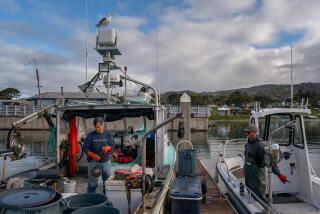New England Fishermen May Face Curbs
- Share via
PORTLAND, Me. — The days when anyone in New England could buy a permit, don a yellow slicker, cast his net and call himself a fisherman may be coming to an end.
The New England Fishery Management Council, faced with a declining fish population, is considering regulations that could transform the industry.
Commercial fishermen currently face size restrictions on their nets and on the fish they may catch. There are also occasional closings of spawning areas.
By summer, fishermen could also be facing limits on the number of fish they may take and how many times they may go out, a freeze on new licenses, more restrictive net regulations, more closings of fishing areas and stepped-up enforcement.
The New England catch of groundfish--which includes haddock, redfish and yellowtail flounder--has dropped by half since 1983, a decline blamed on overfishing.
“We’re saying fishermen can bring (fish populations back up, but) it will be a painful five or 10 years. But, if they don’t (limit catches now), there is no future,” said Frank Grice, chairman of a Massachusetts task force that studied the decline in the catch.
Arthur J. Odlin, a Maine fisherman, said there is little argument that measures are needed to help fish return. However, he said limits on the catch and a freeze on licenses had been impossible to enforce the last time they were used, in the late 1970s.
“When you tell me how many days I can go out, and when you tell me what I can catch, and when you tell what I can’t catch, you’ve really taken my business away from me,” Portland fisherman Roger Woodman Jr. said. “That’s my biggest fear.”
Others say such restrictions are inevitable. “From my perspective, I don’t think we can simply allow the economy of the industry to drive the system,” said Barry Gibson, editor of Salt Water Sportsman magazine in Boston.
In the late 1960s and early ‘70s, foreign fleets plundered New England’s rich fishing grounds.
But the fish rebounded after foreign boats were banned from fishing within 200 miles of the coast and regional councils were established under the U.S. Commerce Department to manage fisheries.
The fish population is down again, though. In New England, the catch of major groundfish--fish that feed close to the ocean floor--has dropped from 152,300 metric tons in 1983 to just 77,200 metric tons in 1989.
“There is the feeling that fishing is a right, not a privilege,” said Philip Coates, a council member and director of the Massachusetts Division of Marine Fisheries. “That feeling has to be overcome. Fishing is a privilege.”
More to Read
Sign up for Essential California
The most important California stories and recommendations in your inbox every morning.
You may occasionally receive promotional content from the Los Angeles Times.













